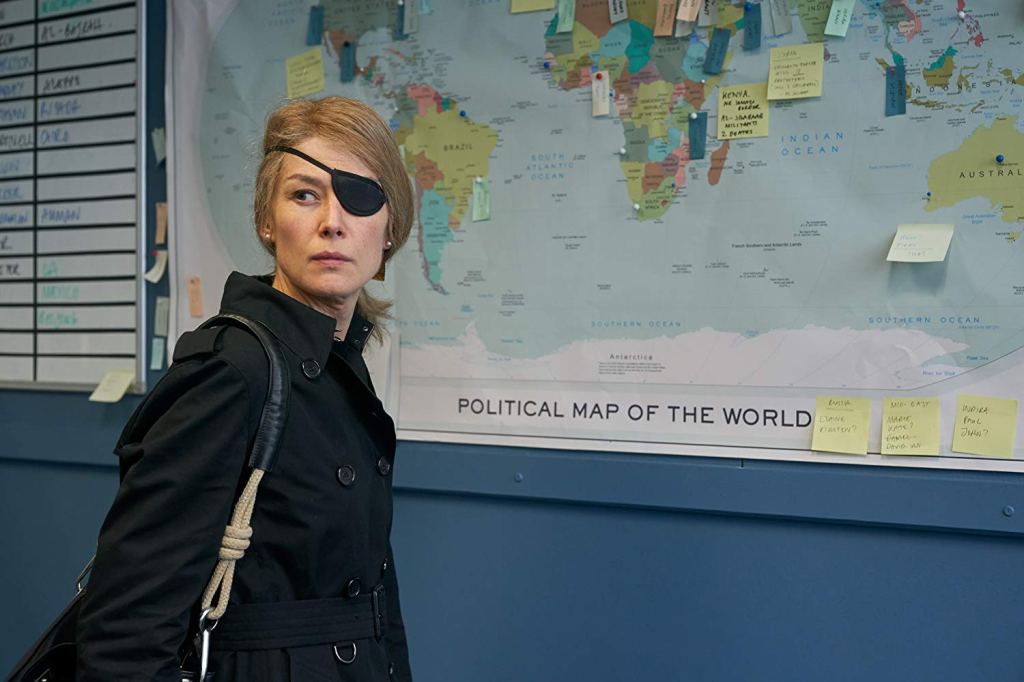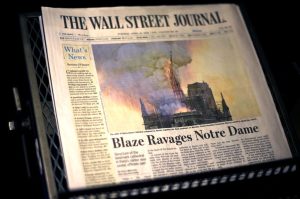The truth hurts, and the standard of truth in war reporting requires eyewitness accounts of suffering and death. Marie Colvin of the Sunday Times of London, killed at Homs, Syria in 2012 in a targeted bombardment by Assad’s army reports, was the most accomplished war reporter of her time, and saw more war than most soldiers. Matthew Heineman’s A Private War, with Rosamund Pike as Colvin, is a cruel and haunting study in compulsion — the compulsion to tell the truth, the compulsion to live near death, and the compulsion to repeat the experience until death gets too near.
In 2001, Colvin (Rosamund Pike) turns down what passes for a safe assignment, covering Yasser Arafat’s funeral in Ramallah, in order to trek through the forests of Sri Lanka and interview a leader of the Tamil Tigers. She is accompanying a night patrol with the Tigers when they are ambushed by the Sri Lankan military. She throws herself to the ground but, in the first of the endless counter-intuitive acts that define her life, she stands up with arms raised and calls out that she is a journalist. A grenade is thrown in reply. She loses her sight in one eye.
Later that year, wearing an evening dress and a piratical black eye patch, Colvin receives the Foreign Correspondent of the Year award from the British Press Association. Glamorous, witty and beautiful in public, she privately grieves over the children she was unable to conceive, and is tormented by horrific memories and panic attacks. Yet she keep returning to the scene of other people’s crimes.
In Iraq in 2003, Colvin pairs up with an English photographer, an ex-soldier named Paul Conroy (Jamie Dornan). They give their embedded associates the slip, and follow a tip about a mass grave near Fallujah. Stopped at a roadblock in the desert, Colvin claims that they are nurses, and proffers her membership card to a London gym as proof. They are lined up against their SUV to be shot — their interpreter is saying his prayers with his face against the window — then released. As they drive away, Colvin whoops with glee.
The news business runs on blood and adrenalin, and nowhere is there more blood and adrenaline than in war. Near Fallujah, Colvin and Paul Conroy witness an excavator bringing a skeleton up from the ground in its metal hand, the remains of one of some six hundred Kuwaitis murdered by Saddam Hussein’s soldiers during the first Gulf War. Colvin weeps from her good eye, but files her evidence, the ‘first draft of history’ as she rightly calls it, to London.
Back in Britain, she suffers panic attacks and needs a quart of vodka in order to stifle the voices and images. She is hospitalized, and in this Switzerland of the mind, neither a war zone nor her hedonistic London life, she admits that she is caught in a story that can only have one end: ‘I hate being in a war zone and I also feel compelled, compelled to see it for myself.’
In hospital, Colvin has two visitors. Paul Conroy convinces her that she has PTSD, and tells her she is addicted to war. Sean Ryan, editor of the Sunday Times’s foreign desk, tells her that her job is safe and that she has ‘a God-given talent to make people stop and care.’ Colvin returns to work, first in Afghanistan, where we see the effect of an IED on a truckload of civilians, and then Misrata in Libya, where Colvin, in her haste to gather evidence of mass rape by Gaddafi’s forces, races ahead of her military escorts.
‘I see it so you don’t have to,’ she tells Sean. ‘I’m finished.’ A Private War implies that Colvin’s employers knowingly drove her to her death, but she was already driving herself there. When Winston Churchill went to the Sudan in 1898 as both soldier and war correspondent, he accepted a commission from the Society for Psychical Research, to send a message from the other side if he died. Colvin kept volunteering for a similar commission, from moral conviction and professional pride, and because the psychological wounds of witnessing meant that in the end, she was most herself when she was most in danger.
A Private War pulls no punches about the price in mind and body. In Libya, Conroy has to talk her off the roof, and she is drinking so much that her teeth are falling out. In the end, she takes off her eyepatch. Her unseeing eye has a thousand-yard stare. She is finished, because she is dying inwardly and there can be no resolution other than violent death.
In 2012, Colvin and Conroy enter rebel-held Homs under heavy fire. There are nearly 30,000 civilians trapped in the city under constant artillery and air bombardment, and no doctors in the makeshift hospital. Her reports rebut Assad’s claim that he is only bombing terrorists, but she insists on remaining. She was killed, and Conroy badly wounded, as they attempted to return to the hospital to gather more evidence.
A Private War is hard to watch — we see the body parts, bombings and bleedings out that will traumatize Colvin — but it goes to the heart of the compact between the consumers and producers of news. Pike and Dornan are superb as Colvin and Conroy, and Tom Hollander plays Sean Ryan with the necessary moral awkwardness of a witness to Colvin’s inner conflict. She died where she wanted to live, in the hell of other people’s wars.
Dominic Green is Life & Arts Editor of Spectator USA.

















